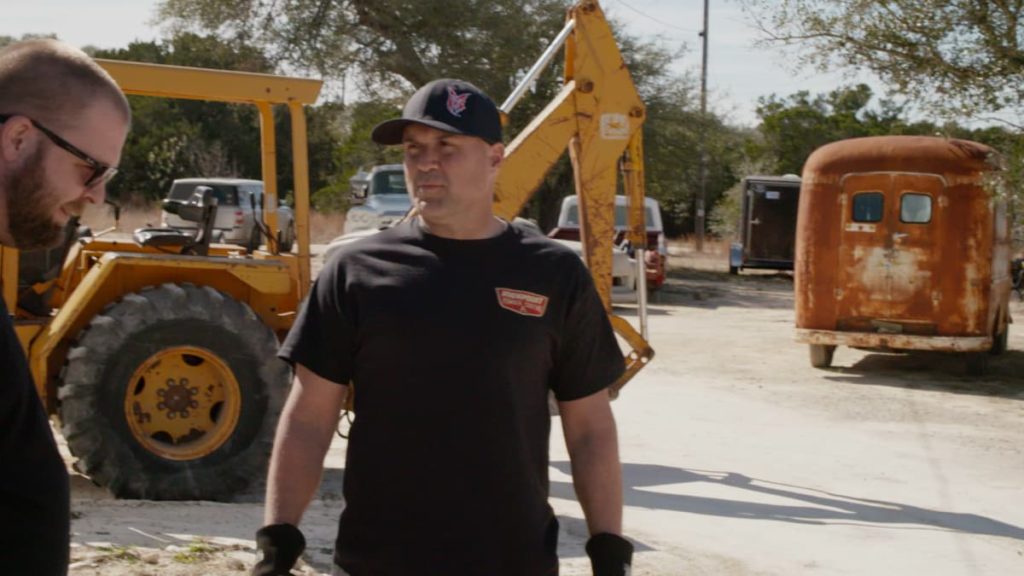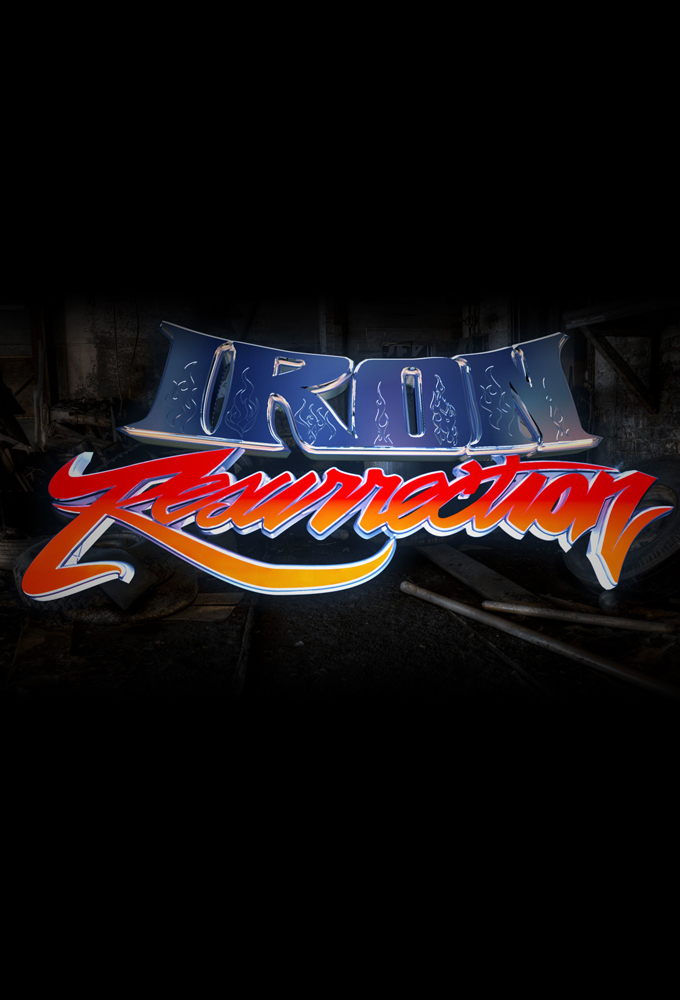Why Did Iron Resurrection Get Cancelled? The Untold Story Behind The Controversial Show
**Let’s get real here for a second, folks. If you're reading this, chances are you're one of those fans who were completely blindsided by the cancellation of "Iron Resurrection." It was supposed to be the next big thing in reality TV—a show that promised drama, competition, and a whole lot of metal. But then, just like that, it disappeared from our screens without so much as an explanation. So why did Iron Resurrection get cancelled? Let’s dive deep into the mystery because, trust me, it’s not as simple as it seems.**
When the show first premiered, there was so much buzz around it. People were talking about the incredible lineup of contestants, the high-stakes challenges, and the jaw-dropping production value. It felt like the perfect storm of entertainment. But somewhere along the way, things went south, and the show vanished into thin air. What happened? Was it a creative decision, financial troubles, or something more scandalous? We’re about to find out.
Now, before we jump into the nitty-gritty details, let’s set the stage. This isn’t just about a TV show getting cancelled—it’s about understanding the bigger picture. In today’s world, where streaming platforms and traditional TV networks are fighting tooth and nail for viewership, every cancellation tells a story. And the story of Iron Resurrection is one worth telling.
Read also:Does Paulo Avelino Have A Girlfriend Unveiling The Heart Of Brazils Heartthrob
Table of Contents
- The Background of Iron Resurrection
- Ratings and Audience Engagement
- Creative Differences Behind the Scenes
- Financial Constraints and Budget Issues
- Loss of Sponsorship and Partnerships
- Controversies Surrounding the Show
- Fan Reaction and Public Opinion
- Lessons Learned from the Cancellation
- The Future of Reality TV Shows Like Iron Resurrection
- Conclusion: Why Did Iron Resurrection Get Cancelled?
The Background of Iron Resurrection
Let’s rewind for a second and talk about what Iron Resurrection actually was. At its core, it was a reality competition show centered around blacksmithing and metalworking. Contestants from all over the world came together to showcase their skills, create mind-blowing metal masterpieces, and compete for a grand prize that would change their lives forever. The concept was solid, the production was top-notch, and the hosts were charismatic. On paper, it looked like a recipe for success.
But here’s the thing—great ideas don’t always translate into great shows. While the premise sounded awesome, there were underlying issues that started to surface early on. Some critics argued that the format was too similar to other shows in the same genre, while others felt that the challenges didn’t push the contestants far enough. These concerns might seem minor, but they added up over time.
Why Was Iron Resurrection Created?
Iron Resurrection wasn’t created in a vacuum. It was part of a larger trend in reality TV where niche crafts and skills are celebrated. Think of shows like "Forged in Fire" or "Nailed It!"—they’ve proven that there’s an audience for these types of programs. The creators of Iron Resurrection likely saw this demand and wanted to capitalize on it. They poured resources into building a show that would stand out, but sometimes even the best-laid plans can go awry.
Ratings and Audience Engagement
One of the biggest factors in any show’s success—or failure—is its ratings. When it comes to why Iron Resurrection got cancelled, the numbers don’t lie. Despite the initial hype, the show struggled to retain viewership over time. According to Nielsen ratings, the average viewership dropped significantly after the first few episodes. This isn’t uncommon for new shows, but it’s still a major red flag for networks.
Why did this happen? Well, there are a few possibilities. First, the target audience might not have been as large as expected. While there are plenty of people interested in metalworking, that interest doesn’t always translate into consistent viewership. Second, the show might have failed to engage viewers emotionally. Great reality TV isn’t just about showcasing talent—it’s about creating connections and telling compelling stories. If Iron Resurrection didn’t deliver on that front, it’s no surprise that viewers tuned out.
Engaging Viewers in a Crowded Market
Let’s face it—the competition in the TV market is fierce. Viewers have endless options when it comes to what they watch, and standing out is harder than ever. Shows like "Iron Resurrection" need to offer something unique to capture attention. Unfortunately, many fans felt that the show lacked that "je ne sais quoi" that keeps people coming back for more. Without strong engagement, it’s only a matter of time before a show gets the axe.
Read also:Unveiling The World Of Movierulz Tamilrockers 2023 Download Your Ultimate Guide
Creative Differences Behind the Scenes
Creative differences are often cited as a reason for show cancellations, and Iron Resurrection was no exception. Behind the scenes, there were reportedly clashes between the showrunners and the contestants over the direction of the challenges. Some contestants felt that the tasks were too easy, while others thought they were unnecessarily difficult. This kind of disagreement can create a toxic environment and lead to a lack of cohesion in the final product.
Additionally, there were rumors of tension between the hosts and the production team. While nothing was officially confirmed, sources close to the show hinted at disagreements over the tone and style of the program. When the people making the show aren’t on the same page, it shows on screen—and audiences notice.
Can Creative Disputes Be Avoided?
It’s worth noting that creative disputes aren’t unique to Iron Resurrection. Every show deals with them to some extent, but the key is how they’re handled. In this case, it seems like the issues weren’t resolved in a way that satisfied everyone involved. Moving forward, networks and producers need to prioritize communication and collaboration to avoid similar situations in the future.
Financial Constraints and Budget Issues
Money talks, and in the world of TV, it often decides the fate of a show. Financial constraints played a significant role in the cancellation of Iron Resurrection. Producing a high-quality reality competition show is expensive, especially when it involves specialized materials and equipment. Without a steady stream of revenue, it’s difficult to sustain a show like this.
Furthermore, the show’s budget may have been mismanaged. Some insiders suggested that too much money was spent on flashy production elements rather than on improving the core content. While good visuals are important, they can’t save a show if the substance isn’t there. When the financials don’t add up, networks have no choice but to cut their losses.
Managing Finances in TV Production
Learning from the financial missteps of Iron Resurrection is crucial for future projects. Producers need to strike a balance between investing in production value and ensuring that the show’s content is engaging enough to justify the costs. This requires careful planning and a clear understanding of what makes a show successful in the long run.
Loss of Sponsorship and Partnerships
Sponsorships and partnerships are a lifeline for many TV shows, and Iron Resurrection was no exception. Unfortunately, the show reportedly lost several key sponsors midway through its run. This could have been due to a variety of reasons, including poor performance metrics or negative publicity. Without the financial backing of sponsors, the show’s future became uncertain.
Sponsors play a vital role in keeping shows afloat, and their departure can have a ripple effect. When sponsors pull out, networks often reassess whether a show is worth continuing. In the case of Iron Resurrection, the loss of support may have been the final straw.
Building Strong Sponsor Relationships
To avoid similar situations in the future, networks need to focus on building strong, lasting relationships with sponsors. This involves delivering measurable results and ensuring that sponsors see value in their investment. It’s not just about securing deals—it’s about maintaining them.
Controversies Surrounding the Show
No show is immune to controversy, and Iron Resurrection had its fair share. Some fans accused the show of being overly scripted, claiming that the outcomes of the challenges were predetermined. Others took issue with the way contestants were portrayed, arguing that certain individuals were unfairly favored by the judges. These controversies may have alienated some viewers and contributed to the show’s downfall.
Addressing controversies head-on is essential for any show’s survival. When issues arise, networks need to be transparent and proactive in resolving them. In the case of Iron Resurrection, it seems like these concerns weren’t addressed effectively, which only added to the show’s problems.
Dealing with Controversy in Reality TV
Controversy isn’t necessarily a bad thing—it can generate buzz and keep people talking. However, it needs to be managed carefully. Shows that handle controversies well often come out stronger, while those that ignore them risk losing credibility. Iron Resurrection could have benefited from a more strategic approach to handling these issues.
Fan Reaction and Public Opinion
When a show gets cancelled, fans are often the ones who feel it the most. The reaction to Iron Resurrection’s cancellation was mixed. Some fans were devastated, while others were less surprised given the show’s struggles. Social media was ablaze with discussions, with hashtags like #SaveIronResurrection trending for days.
Public opinion plays a huge role in a show’s success or failure. Networks pay attention to what fans are saying, and sometimes they even listen. While the cancellation of Iron Resurrection couldn’t be reversed, the outpouring of support from fans showed just how passionate people were about the show.
How Fans Can Impact a Show’s Fate
Fans have more power than they sometimes realize. By speaking up and showing their support, they can influence networks’ decisions. Whether it’s through social media campaigns or petitions, fan activism can make a difference. In the case of Iron Resurrection, it might not have been enough to save the show, but it certainly made an impact.
Lessons Learned from the Cancellation
Every cancellation is a learning experience, and Iron Resurrection is no exception. One of the biggest takeaways is the importance of balancing creativity with practicality. Shows need to be innovative and engaging, but they also need to be financially viable. Another lesson is the value of strong relationships—both with sponsors and with fans. Without these connections, even the best shows can falter.
Looking ahead, networks and producers need to be more strategic in their approach to developing new shows. They should focus on creating content that resonates with audiences while also being mindful of the financial realities of the industry.
What Can Future Shows Learn?
Future reality TV shows can learn a lot from the mistakes of Iron Resurrection. By prioritizing engagement, managing finances wisely, and addressing controversies effectively, they can increase their chances of success. It’s all about finding the right formula and sticking to it.
The Future of Reality TV Shows Like Iron Resurrection
Despite its cancellation, Iron Resurrection left a mark on the reality TV landscape. It proved that there’s an audience for niche crafts and skills, even if the execution wasn’t perfect. As the industry continues to evolve, we can expect to see more shows exploring similar themes. The key will be learning from past mistakes and building on what works.
Who knows? Maybe someday we’ll see a revival of Iron Resurrection—or at least a show inspired by its legacy. Until then, fans can hold onto the memories and the lessons learned from this unique program.
Conclusion: Why Did Iron Resurrection Get Cancelled?
In conclusion, the cancellation of Iron Resurrection was the result of a combination of factors, including poor ratings, creative differences, financial constraints, and controversies. While the show had a lot going for it, it ultimately couldn’t overcome these challenges. However, its legacy lives on, and it serves as a valuable case study for anyone interested in the world of reality TV.
So, what do you think? Do you agree with the reasons behind the cancellation, or do you have your own theories? Let us know in the comments below, and don’t forget to share this article with your fellow fans. Together, we can keep the conversation going and honor the memory of Iron Resurrection.



